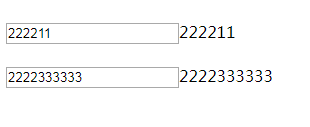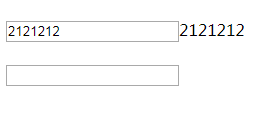AngularJs 指令中 的Scope属性
一、概念说明
可以是true、 false 、哈希对象 {}
1、true
新创建了一个作用域,且继承了父作用域;在初始化的时候,用了父作用域的属性和方法去填充我们这个新的作用域。它和父作用域不是同一个作用域。
2、false 默认(不指定时候 )
创建的指令和父作用域(其实是同一个作用域)共享同一个model模型,在指令中修改模型数据,会反映到父作用域的模型中。
3、{}
新创建了一个作用域,不继承继承了父作用域。表示一个独立的作用域 isolated
例子:
scope :
{
name:'@',//结果就是test
detail:'=', //结果要通过$scope.detail计算
onUpdate:'&'//绑定一个事件
}
<user-details name ='test' detail='detail', on-update='updateIt(times)'></user-details>
二、例子
1、scope: false(或不写即默认false)
不产生新作用域,指令的作用域和父作用域是同一个对象
<!DOCTYPE html>
<html ng-app="myApp">
<head>
<meta http-equiv="Content-Type" content="text/html; charset=utf-8" />
<title></title>
<meta charset="utf-8" />
<script src="http://apps.bdimg.com/libs/angular.js/1.4.6/angular.min.js"></script>
</head>
<body>
<div ng-controller="MyController">
<my-directive></my-directive>
<my-directive></my-directive>
</div> <script type="text/javascript">
var myAppModule = angular.module("myApp",[]); myAppModule
.controller('MyController', function($scope){
$scope.name = '2222';
})
.directive("myDirective",function(){
return {
restrict:'AE',
scope: false,//或不写即默认false,指令的作用域和父作用域是同一个对象
template:'<div><input type="text" ng-model="name"/>{{name}}</div><br>'
};
});
</script>
</body>
</html>
运行结果 :

分析:一个输入改变,四个位置的内容一起改变。
作用域分析:ng-app产生rootScope,ng-controller指令产生一个作用域scope,两个指令myDirective,由于scope: false(或不写即默认false),指令的作用域和父作用域是同一个对象。一共4个作用域。
所以,name在一个地方变了,就所有地方变。
2、scope: true
产生新作用域,而且继承父作用域属性和方法。两个指令作用域互相对立,而且都继承自父作用域(ng-controller产生)。
<!DOCTYPE html>
<html ng-app="myApp">
<head>
<meta http-equiv="Content-Type" content="text/html; charset=utf-8" />
<title></title>
<meta charset="utf-8" />
<script src="http://apps.bdimg.com/libs/angular.js/1.4.6/angular.min.js"></script>
</head>
<body>
<div ng-controller="MyController">
<my-directive></my-directive>
<my-directive></my-directive>
</div> <script type="text/javascript">
var myAppModule = angular.module("myApp",[]); myAppModule
.controller('MyController', function($scope){
$scope.name = '2222';
})
.directive("myDirective",function(){
return {
restrict:'AE',
scope: true,
template:'<div><input type="text" ng-model="name"/>{{name}}</div><br>'
};
});
</script>
</body>
</html>
运行结果;

两行数据立变化,即每个指令作用域互相独立,且继承父作用域。
3、scope: {}
产生独立新作用域,而且父作用域无关。
<!DOCTYPE html>
<html ng-app="myApp">
<head>
<meta http-equiv="Content-Type" content="text/html; charset=utf-8" />
<title></title>
<meta charset="utf-8" />
<script src="http://apps.bdimg.com/libs/angular.js/1.4.6/angular.min.js"></script>
</head>
<body>
<div ng-controller="MyController">
<my-directive></my-directive>
<my-directive></my-directive>
</div> <script type="text/javascript">
var myAppModule = angular.module("myApp",[]); myAppModule
.controller('MyController', function($scope){
$scope.name = '2222';
})
.directive("myDirective",function(){
return {
restrict:'AE',
scope: {},
template:'<div><input type="text" ng-model="name"/>{{name}}</div><br>'
};
});
</script>
</body>
</html>
运行结果,刚开始运行,都是空,因为,没有继承父作用域的name

输入一个输入框后,只跟指令内的作用域同步

输入另一个,两个指令间不互相影响

4、{}中的@
字符串绑定,即,把内容直接当做字符串输出,但是{{str2}}(<my-directive content="{{str2}}"></my-directive>),还是会解析成字符串再输出。
<!DOCTYPE html>
<html ng-app="myApp">
<head>
<meta http-equiv="Content-Type" content="text/html; charset=utf-8" />
<title></title>
<meta charset="utf-8" />
<script src="http://apps.bdimg.com/libs/angular.js/1.4.6/angular.min.js"></script>
</head>
<body>
<div ng-controller="MyController">
<my-directive content="test string"></my-directive>
<my-directive content="{{str2}}"></my-directive>
<my-directive content="test()"></my-directive>
</div> <script type="text/javascript">
var myAppModule = angular.module("myApp",[]); myAppModule
.controller('MyController', function($scope){
$scope.str1 = "hello";
$scope.str2 = "world";
$scope.str3 = "angular";
})
.directive("myDirective",function(){
return {
restrict:'AE',
scope: {
content:'@'
},
template:'<div>{{content}}</div>'
};
});
</script>
</body>
</html>
运行结果:

第一个和第三个都是字符串原样输出,第二个会解析后输出。
5、{}中=
变量绑定
<!DOCTYPE html>
<html ng-app="myApp">
<head>
<meta http-equiv="Content-Type" content="text/html; charset=utf-8" />
<title></title>
<meta charset="utf-8" />
<script src="http://apps.bdimg.com/libs/angular.js/1.4.6/angular.min.js"></script>
</head>
<body>
<div ng-controller="MyController">
ctrl:<input type="text" ng-model="testname"><br>
directive:<my-directive name="testname"></my-directive>
</div> <script type="text/javascript">
var myAppModule = angular.module("myApp",[]); myAppModule
.controller('MyController', function($scope){
$scope.testname="my name is hyx";
})
.directive("myDirective",function(){
return {
restrict:'AE',
scope:{
name:'='
},
template:'<input type="text" ng-model="name">',
repalce:true
};
});
</script>
</body>
</html>

解析过程:
(1 )、在控制器MyController对应的div中,定义了一个变量ng-model —— testname。
(2)、 testname对应的是输入框中输入的值。
(3 )、然后把这个变量当做一个参数传递给my-directive这个标签的name属性。
(4)、 在my-directive标签中,又把这个name绑定到模板中的一个输入框内。
最终两个输入框的内容被连接起来,无论改变哪一个输入框内的值,testname与name都会发生改变。即通过my-directive标签内的属性依赖关系把 testname与name连接在一起,
6、{}中的&
方法绑定,当做方法执行,sayHello,sayNo,参数动态绑定到输入框。
<!DOCTYPE html>
<html ng-app="myApp">
<head>
<meta http-equiv="Content-Type" content="text/html; charset=utf-8" />
<title></title>
<meta charset="utf-8" />
<script src="http://apps.bdimg.com/libs/angular.js/1.4.6/angular.min.js"></script>
</head>
<body>
<div ng-controller="MyController"> <my-directive say="sayHello(name)"></my-directive>
<my-directive say="sayNo(name)"></my-directive>
</div> <script type="text/javascript">
var myAppModule = angular.module("myApp",[]); myAppModule
.controller('MyController', function($scope){
$scope.sayHello = function(name){
console.log("hello !"+ name);
};
$scope.sayNo = function(name){
console.log("no !"+ name);
};
})
.directive("myDirective",function(){
return {
restrict:'AE',
scope:{
say:'&'
},
template:'<input type="text" ng-model="username"/><br>'+
'<button ng-click="say({name:username})">click</button><br>',
repalce:true
};
});
</script>
</body>
</html>

通过say在scope中的定义,angular知道了say对应的是个方法。
通过{name:username}的关联,知道了传入的是username。
AngularJs 指令中 的Scope属性的更多相关文章
- angularjs指令中的scope
共享 scope 使用共享 scope 的时候,可以直接从父 scope 中共享属性.因此下面示例可以将那么属性的值输出出来.使用的是父 scope 中定义的值. js代码: app.controll ...
- 【转】angularjs指令中的compile与link函数详解
这篇文章主要介绍了angularjs指令中的compile与link函数详解,本文同时诉大家complie,pre-link,post-link的用法与区别等内容,需要的朋友可以参考下 通常大家在 ...
- angularjs指令中的compile与link函数详解
这篇文章主要介绍了angularjs指令中的compile与link函数详解,本文同时诉大家complie,pre-link,post-link的用法与区别等内容,需要的朋友可以参考下 通常大家在 ...
- AngularJS自定义指令directive:scope属性 (转载)
原文地址:http://blog.csdn.net/VitaLemon__/article/details/52213103 一.介绍: 在AngularJS中,除了内置指令如ng-click等,我们 ...
- angularjs指令中scope参数 true、false、{} 的区别详解
scope 有三个参数 true.false.{} scope 默认是 false,当 scope设置为true时,会从父作用域继承并创建一个新的作用域对象, 按照true .false的反向思维,我 ...
- angularjs指令中的compile与link函数详解(转)
http://www.jb51.net/article/58229.htm 通常大家在使用ng中的指令的时候,用的链接函数最多的是link属性,下面这篇文章将告诉大家complie,pre-link, ...
- angularjs指令中的compile与link函数详解补充
通常大家在使用ng中的指令的时候,用的链接函数最多的是link属性,下面这篇文章将告诉大家complie,pre-link,post-link的用法与区别. angularjs里的指令非常神奇,允许你 ...
- AngularJs -- 指令中使用子作用域
下面将要介绍的指令会以父级作用域为原型生成子作用域.这种继承的机制可以创建一个隔离层,用来将需要协同工作的方法和数据模型对象放置在一起. ng-app和ng-controller是特殊的指令,因为它们 ...
- AngularJS 指令中的require
require参数可以被设置为字符串或数组,字符串代表另外一个指令的名字.require会将控制器注入到其值所指定的指令中,并作为当前指令的链接函数的第四个参数.字符串或数组元素的值是会在当前指令的作 ...
随机推荐
- iOS.AutoLayout.2.CustomView-with-AutoLayout
Custom View Which Support AutoLayout 创建支持AutoLayout的Custom View AutoLayout 通过使view更加的自组织来减轻controlle ...
- Linux下使用rsync最快速删除海量文件的方法
常用的删除命令rm -fr * 就不好用了,因为要等待的时间太长.所以必须要采取一些非常手段.我们可以使用rsync来实现快速删除大量文件. 1.先安装rsync: yum install rsyn ...
- pdo不抛出异常
$pdo->setAttribute(\PDO::ATTR_ERRMODE, \PDO::ERRMODE_EXCEPTION);
- vue 设置button disabled
<button v-bind:disabled="dis" @click="alert">button</button> dis:'' ...
- 记录点复习题目和linux学习
哈希怎么底层.key放数组哪部分里面 HashMap实际上是一个“链表散列”的数据结构,即数组和链表的结合体. 开网页怎么获取页面 linux 看进程的cpu 和内存占用率 看哪个端口被占用 ...
- oracle迁移
#导出scott的数据,排除 table_a table_b expdp system/password schemas=scott directory=datadir dumpfile=scott_ ...
- random库的常见用法
import random print( random.randint(1,10) ) # 产生 1 到 10 的一个整数型随机数 print( random.random() ) # 产生 0 到 ...
- Linux学习笔记:Jenkins的使用
在windows中使用Jenkins(Linux系统下类似),步骤是: 1 从官网下载jenkins项目的war包 2 将jenkins.war放到tomcat的webapps目录中,启动tomcat ...
- Java中TreeMap的基本操作
TreeSet有四种种构造函数可以初始化 在代码中主要列出了常用的三种: 构造方法摘要 TreeSet() 构造一个新的空 set,该 set 根据其元素的自然顺序进行排序. Tr ...
- 13个开源GIS软件 你了解几个?
地理信息系统(Geographic Information System,GIS)软件依赖于覆盖整个地球的数据集.为处理大量的 GIS 数据及其格式,编程人员创建了若干开源库和 GIS 套件. GIS ...
